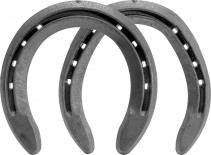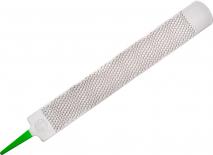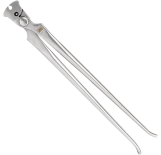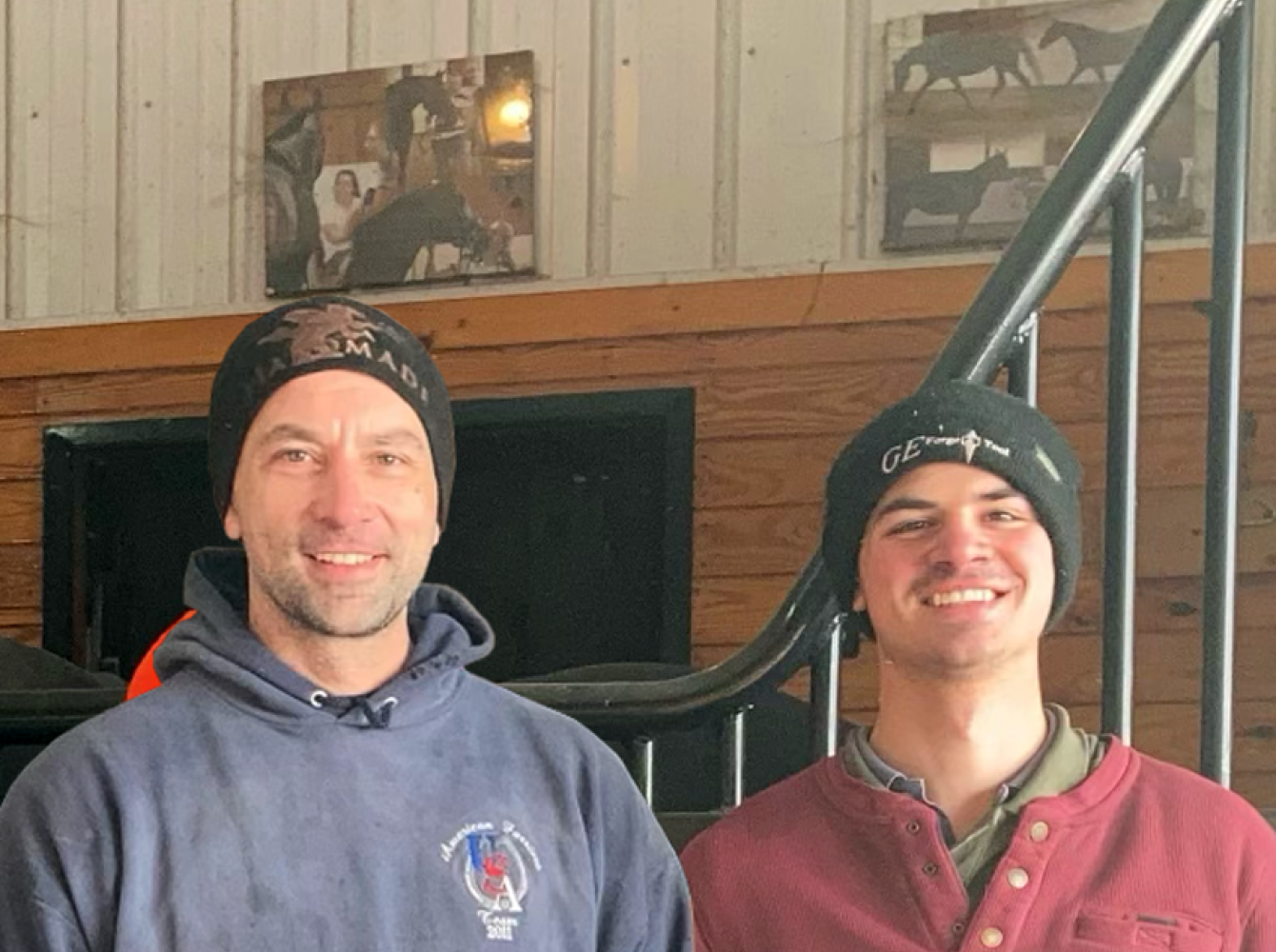
Ben Mangan, CJF & Shamus Mangan
“Someone somewhere is always practicing. So practice.” Ben Mangan, CJF, and Shamus Mangan are both strong competitors. But as part of a unique horseshoeing family, they are also strong collaborators.
Where “Family Values” Means Neat Trims and Efficient Resets
Ben and Shamus Mangan aren’t simply a father-and-son farrier team. They’re at the helm of a family business that includes Ben’s wife, Nicole, and Shamus' three siblings—Anastasia, 20, Marie, 19, and Troy, 17. Occasionally the team will have additional farriers work alongside them, recently having Lena Guggisberg for a few weeks, hailing all the way from Switzerland.
The business has a radius of about 100 miles from its Carthage, New York base. It runs off a single book, which Ben manages, even when the crew splits to take a second rig out. The family doesn’t just go on calls together; the business is more involved than that, where each shoeing is held to competition standards. Ben talks about how, at a given stop, he starts forging “while Shamus is prepping, someone else is nailing, and then someone else is clinching.” They work as a coordinated team, a pit crew for horses. This method requires communication, each person checking and critiquing the other’s work.
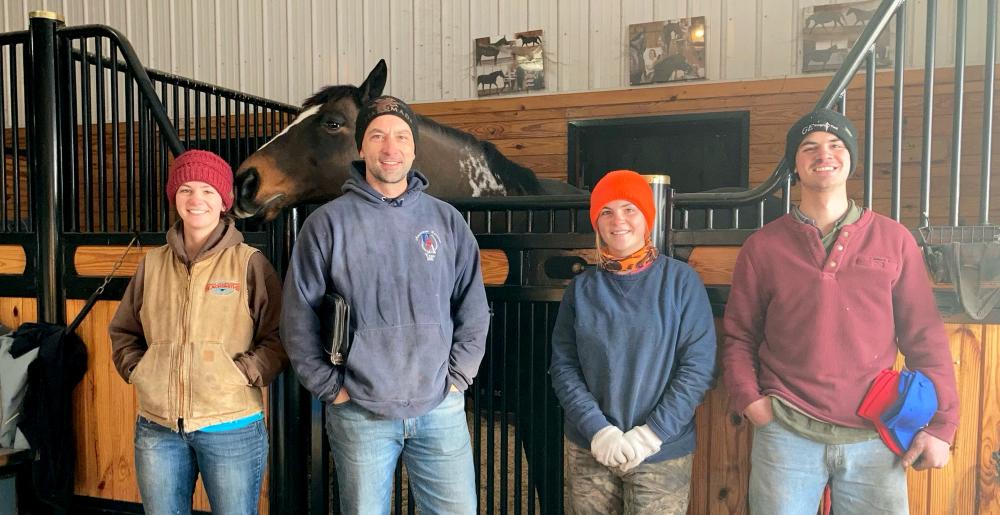
“I feel like you get to know your family better. I think that makes you stronger.”
- Shamus
The family business wasn’t a part of a grand plan, far from it. Looking back over the years, Ben said, “Raising kids is like being on an ocean. And if somebody says they have a plan for how to do it, I wish them luck.” Though unplanned, it’s clear their methods work, and it doesn’t hurt that they have Nicole to provide additional support as needed. When she isn’t busy running hunting dogs for tracking bears and rabbits, Nicole keeps the team on track by helping out with business communications and hospitality for any visiting farriers.
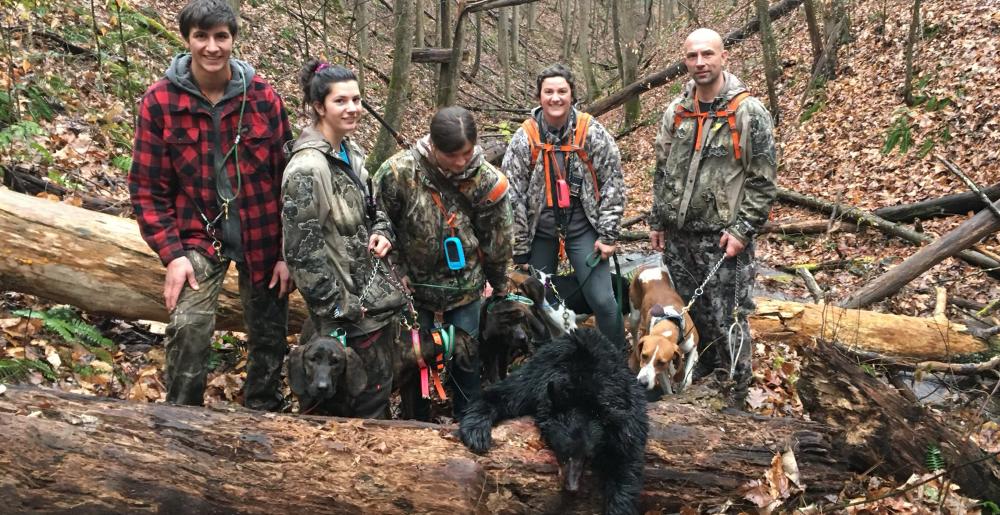
Each member of the Mangan farrier team has unique strengths and differing ambitions. With decades of business building, accreditations, and competition experience behind him, Ben is committed to competing and leading the crew. Marie is both methodical and meticulous, and she also loves the work for the freedom it gives her. Troy is confident and picks up new skills quickly despite being undecided about his future profession. Shamus is great at reading horses and is well into exploring competitions in his own right. And then there’s Anastasia, who runs the truck, which means she plays a key role in preparing each shoeing for success. You’ll find she can do anything from operating the forge to drilling and tapping. Ben is quick to point out, “They’re all more patient than me.”
Ben says, “I enjoy having them in the truck. It makes the days fly by.” Shamus adds that he enjoys watching his siblings “grow into the people they’re going to be.” It’s the kind of family experience that was once common in small businesses and farms but is now rare.
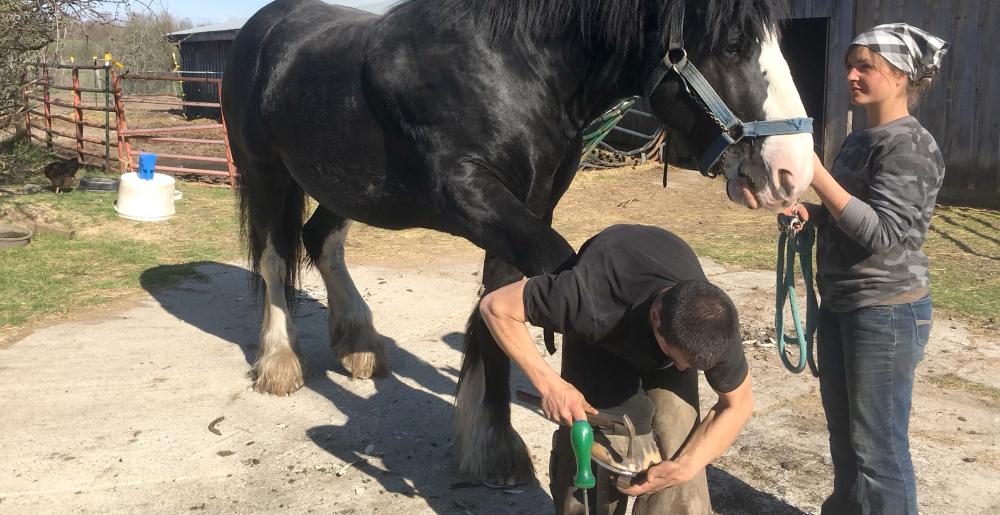
“I'll be out in the truck. I'll turn around and walk in, and everybody's bent over working. Everybody's just doing their thing. And I think I’m a lucky man.” - Ben
Local business, global standards
They operate at a pace set by farriers who know how to perform under pressure. Of course, Ben is a world-class competitor, and, at 21, Shamus has already competed in England and Canada on the US Apprentice Team as well as major American competitions.
Shamus talked about how the clock is one of the most intimidating aspects of competition. “I’d find myself being stressed out about the clock.” The key is practice and hard-won confidence.
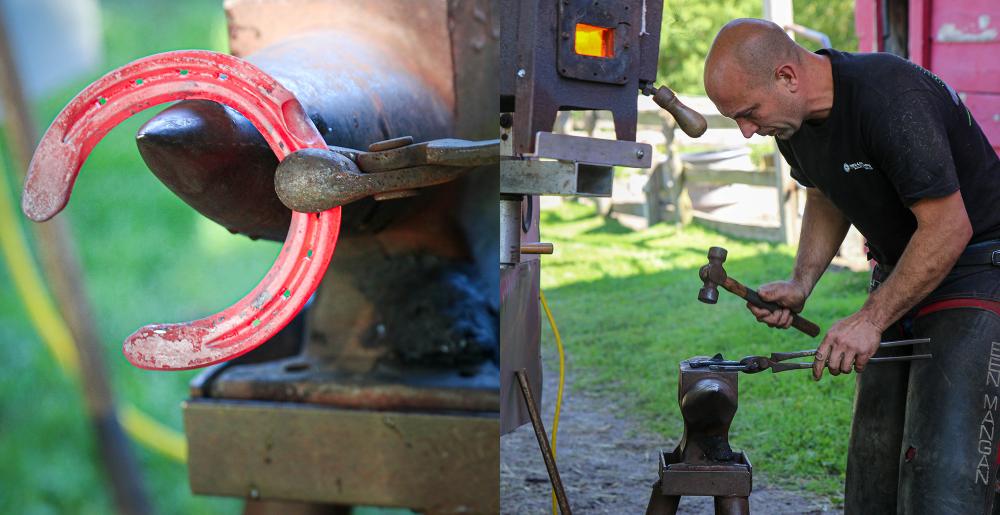
“Some of the stress you feel is simply from not running the clock enough. You have to run the clock, and you have to be really confident in the knowledge you have. Dad and Steven Beane taught me that. ” - Shamus
Ben has taken what he and Shamus honed at elite competitions around the world and made it the basis of their day-to-day work. He further explains that each job revolves around proper timing, checklists, and then checking one another’s work. Ben points out that “every horse gets the same trim—one that meets the competitive standard— and problems often go away. A client brought me a horse that she thought needed a lot of adjustments. I told her, “It doesn’t need correction. It just needs to be correct.’”
When it comes to nailing, Shamus says they have an important rule, “Heel nails are never higher than toenails. In the long run, that gives you confidence. Anything that we need to help or change, we do with the shoe.”
“We try to shoe to the standard we would compete to when I judge contests.”
- Ben
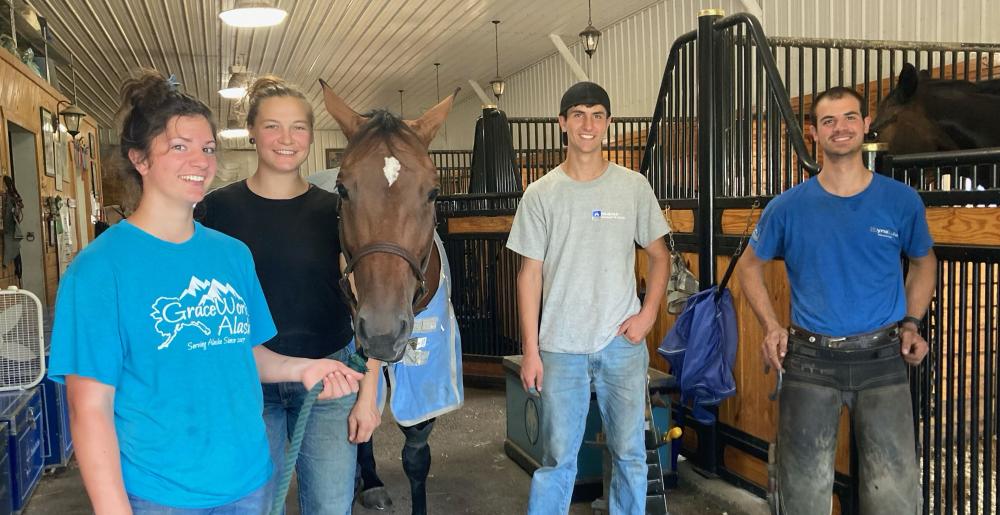
The future may be now.
While planning for the future may be challenging, Ben and Shamus are happy with the family business and the direction it’s taking each of them. Ben treasures these days of working alongside his children and plans to continue competing. He finds competitions to be a humbling experience. “People who think we do competitions for the ego boost haven’t ever competed. When you lose, it’s humbling, and when you win, it’s even more humbling because you’ve lost so many times, you know what the cost of that win is.”
Like his father, Shamus is just as dedicated to the profession and values working alongside his family. While Shamus will continue competing, he’s focused on the simple pleasure of learning alongside his siblings and seeing them grow up.
“I enjoy working, I enjoy the little things and the big things to come.” - Shamus
Q&A with father and son duo Ben Mangan, CJF, and Shamus Mangan
Ben and Shamus Mangan have used the lessons learned in international competition to shape their family business. We talked to them about their distinctive approach.
Ben Mangan, CJF
You recently had a Swiss exchange farrier, Lena Guggisberg, working alongside the family. What surprised her most about American horseshoeing?
In Switzerland, someone holds the foot, so she was surprised when she learned that here, the farrier holds it. She really likes it, because she can feel the horse. She can sense, ‘oh, he's a little bit tight in his knee’ or ‘every time I go to twist the foot on the fetlock, he does this.’ You start to feel soreness in the horse before the owner even knows it.
You were mentored by legends such as Buster Conklin. What would you say to young farriers?
It’s tempting to go to a buy-it-and-apply-it model. But resist that temptation. Learn the basic skills—work with senior farriers—and keep your skills up.
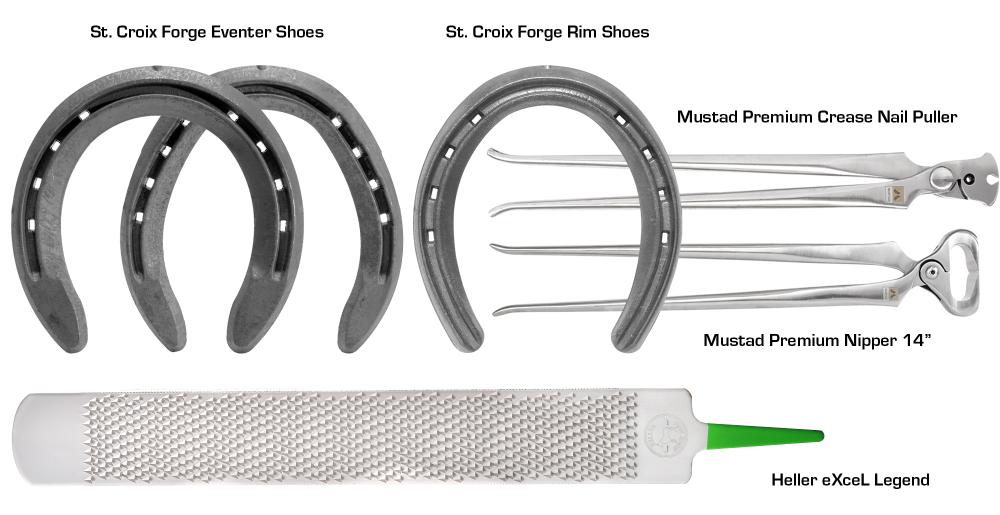
It’s good advice because you clearly know how to make a good horseshoe. When you aren’t building one, what Mustad products are you typically reaching for and why?
For the St. Croix Forge Rims and Eventers, we order them without clips and clip them ourselves. They’ve also got the right amount of traction. Because we pull every single nail – to minimize the reset—we love Mustad Premium Nail Pullers. The handles are comfortable. You can get a hold of the nail, even old, worn-down nails. The Mustad Nippers are like the nail pullers: they do exactly what they were designed to do. You want them to cut exactly where you place them—and not slide down the hoof wall.
Shamus Mangan
You’re in your early twenties. What’s the most rewarding case you’ve had so far?
A client would ride his horse 26 miles to work and 26 miles back. The hooves didn’t get any moisture and were really imbalanced. So we trimmed the feet and soaked them to get them to settle a bit more. Then we made a mushroom shoe for the horse. We were able to create blood flow to make more hoof.
Why does this particular case stand out to you?
A lot of people don’t really understand the beast that they own.
What is your biggest takeaway from the international competitions you’ve entered—and done well in so far?
I’m really proud of meeting new people—people with different lifestyles, people who’ve had different opportunities.
What Mustad products do you rely on?
We use St. Croix Forge Rims and Eventers. They’re easy to modify. They come in left and right, so they’re already offset to the foot. All you have to do is shape them a little. When we open a box of the Heller eXceL Legends (green tangs), we use them as trimming rasps. Then, about halfway through their cycle, we use them as finishing rasps. You can use them for another month after that.
